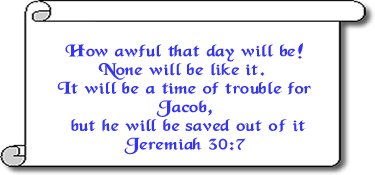








The "birthing pains" often referred to just before the Messiah comes is in reference to similarities of a mother in labor. The same way the labor pains increase in frequency and pain for the pregnant woman the tribulation pain will increase in intensity for the people on earth. However when the birthing pains are over the same way a new child is born, a new era will be born or ushered in and that is the Messianic age.
Jeremiah sees a time - still to come - when men will groan an be in a time of distress as if they were women in labor.
Ask now, and see if a male can give birth. Why do I see every man with his hands on his loins, as a woman in childbirth? And why have all faces turned pale? (Jeremiah 30:6).
For a son dishonors his father, a daughter rises up against her mother, a daughter-in-law against her mother-in-law— a man’s enemies are the members of his own household (Micah 7:6).
Read about The Time Of Jacob's Trouble.
But all these things are meerely the beginning of birth pangs (Matthew 24:8). Jesus was clearly referring here back to Jeremiah's prophecy.
The events of Matthew 24 are much too universal and cataclysmic to represent the dreadful but geographically limited devastation of Jerusalem (in 70 A.D.). That did not involve "famines and earthquakes" (Matt.24:7), believers being "hated by all nations" (v.9), false Christ's and false prophets (vv.5,11), the preaching of the gospel to the whole world (v.14), or the abomination of desolation (v.15). Nor were the sun darkened, the moon extinguished, or the stars dislodged from their places (v.29).(1)
Matthew 24:34 is an explanation of the parable of the fig tree. The idea is that, just as the budding of fig leaves means it is not long until summer, so the generation alive when the signs occur will not have long to wait for Christ's appearance. Those who witness the birth pains will witness the birth.(1)
Here are some other JewishRoots.Net pages that are tribulation related and may be of interest.
The Messiah will come at the end of the Tribulation Period (San. 97a).
1) The MacArthur New Testament Commentary Matthew 24-28 p.63-67